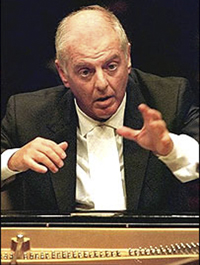
Welcome to the ezine produced by SGI Buddhists that prompts the positive, kindles the constructive, highlights the hopeful and leaves you feeling - well, up!

 Daniel Barenboim, the world-renowned Israeli pianist and conductor, is equally as famous for his efforts to bring Palestinians and Israelis together through music.
Daniel Barenboim, the world-renowned Israeli pianist and conductor, is equally as famous for his efforts to bring Palestinians and Israelis together through music.
By Geraldine Royds
Born in Argentina during the Second World War to parents of Jewish Russian descent, the family moved to Israel in 1952. A child prodigy, he first found fame as a pianist and he is currently guest conductor at La Scala and Music Director for the Berlin State Opera.Barenboim is a controversial figure in his adoptive homeland who has shown himself willing to take courageous public stands both in his promotion of German music and in his vocal opposition to Israel's occupation of the West Bank.
Ten years ago he co-founded, with the late Palestinian intellectual Edward Said, an orchestra made up of young musicians from Israel and Arab countries which fosters dialogue and reconciliation through music.
Barenboim and Said met by chance in a hotel lobby in London in 1990. Said, a Christian Arab, was born in Jerusalem but left in his teens to study in the USA. A Columbia University professor, he was a highly respected commentator on the Arab-Israeli conflict. These two men, who should have been poles apart politically, discovered in that first meeting, which lasted for hours and led to a close friendship, that they had similar visions of Israeli/Palestinian co-operation. They decided to collaborate on musical events and the West-Eastern Divan workshop and Orchestra was born.
Professor Said described the workshop's inception: 'Daniel will not say this, but he was the originator of the thing, because he was approached by the people in Weimar to play a concert. And he thought that - well, you know, he plays a lot of concerts, but since Weimar is a very special city in German history; it was in East Germany, of course, but also was the city of Goethe and Schiller, plus the fact that literally five kilometers away was Buchenwald, one of the worst of the death camps - that something special should be made of the occasion involving him. And the idea was to invite young musicians from the Arab countries, as well as from Israel, to come to Weimar to work with Daniel and some other musicians. And then at night we would have discussions, which I would help along.'
The first workshop took place in Weimar, Germany, in 1999 and since its creation the West-Eastern Divan Orchestra has performed in countries around the world.
In 2005, they realized the dream of the founders and presented an historic concert in the Palestinian city of Ramallah, one of the focal points of the Israeli-Palestinian conflict. Although Barenboim himself had played there before, few thought that the orchestra would ever succeed in performing in the West Bank.
During the intermission, Barenboim addressed the thousand strong crowd: 'It has been said of us that we are an orchestra of peace. That may be a compliment, but this concert will not bring peace, we all know that. Understanding, tolerance, courage and the curiosity to listen to the narrative of the other - that is our goal.'
Despite initial fears, especially of snipers, many of the 70 young musicians later expressed happiness and awe. One young musician commented, 'Now I understand that there is life here. They never show that on television.'
Another explained, 'During the intermission, I spoke with one of the Palestinian guards and asked him if he was happy we came. "You can't imagine how happy I am," he replied, and it simply gave me goosebumps. "And you?" he asked. I told him I was in a state of ecstasy.'
In 2008 Daniel Barenboim became the first person to hold both Israeli and Palestinian passports after being granted honorary Palestinian citizenship. He said he hoped the move would serve as a symbol of peace in this troubled region, and pointed out that the fact that an Israeli citizen can be awarded a Palestinian passport is a sign that it is actually possible.
'I have also accepted it,' he said, 'because I believe that the destinies of the Israeli people and the Palestinian people are inextricably linked. We are blessed - or cursed - to live with each other. And I prefer the first.'
Barenboim reminds people, who insist on confrontation rather than understanding, that they shouldn't forget an old proverb: 'A wound heals on its own. That is a phenomenon of Nature. But if a door is closed, we humans have the possibility of either opening it or keeping it shut. I believe it's our duty always to keep the door open, and then Nature can close the wound.'
Got an inspiring story you want to share? Upload it at 'Send Us Stuff'.

